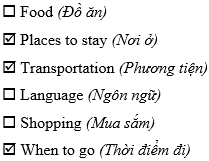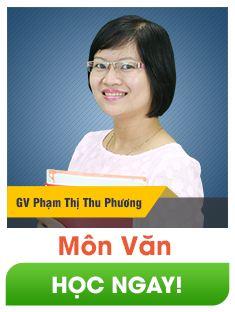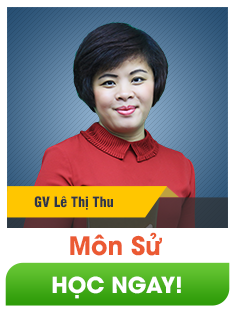Tiếng Anh 10 Unit 3 3CA. Underline the correct adjective in each sentence. B. In pairs, use the words and phrases in the table to give advice for the sentences in A. C. Ask for advice. Read the responses and write questions. D. In pairs, take turns asking the questions in C. Give different advice. E. Listen to the conversation between two friends about a vacation in Japan. Check (✔) the topics they discuss F. Practice the conversation with a partner. Switch roles and practice it again. GÓP Ý HAY - NHẬN NGAY QUÀ CHẤT Gửi góp ý cho HocTot.Nam.Name.Vn và nhận về những phần quà hấp dẫn
Lựa chọn câu để xem lời giải nhanh hơn
A Language Expansion: Describing Places (Mở rộng ngôn ngữ: Mô tả địa điểm) A. Underline the correct adjective in each sentence. (Gạch chân tính từ đúng trong mỗi câu.) 1. There's a cheap / delicious hotel near the train station. 2. The weather is hot in the summer and cold / crowded in the winter. 3. In the afternoon, lots of people go to the beach, so it's crowded / quiet. 4. In Patagonia, the views are beautiful / warm. 5. Don't walk around after midnight because it's a dangerous / cheap part of town. 6. That restaurant is famous for its delicious / safe seafood. 7. England is often very cold / hot in the winter. 8. Shopping is very expensive / ugly at the airport. Lời giải chi tiết:
1. There's a cheap / delicious hotel near the train station. (Có một khách sạn rẻ / ngon gần ga xe lửa.) 2. The weather is hot in the summer and cold / crowded in the winter. (Thời tiết nóng vào mùa hè và lạnh / đông đúc vào mùa đông.) 3. In the afternoon, lots of people go to the beach, so it's crowded / quiet. (Vào buổi chiều, rất nhiều người đi tắm biển, vì vậy nó đông đúc / yên tĩnh.) 4. In Patagonia, the views are beautiful / warm. (Ở Patagonia, cảnh đẹp / ấm áp.) 5. Don't walk around after midnight because it's a dangerous / cheap part of town. (Đừng đi bộ xung quanh sau nửa đêm vì nó là một mặt nguy hiểm / rẻ tiền của thị trấn.) 6. That restaurant is famous for its delicious / safe seafood. (Nhà hàng đó nổi tiếng với hải sản ngon / an toàn.) 7. England is often very cold / hot in the winter. (Nước Anh thường rất lạnh / nóng vào mùa đông.) 8. Shopping is very expensive / ugly at the airport. (Mua sắm thì rất đắt / xấu xí tại sân bay.) B B. In pairs, use the words and phrases in the table to give advice for the sentences in A. (Thực hành theo cặp, sử dụng các từ và cụm từ trong bảng để đưa ra lời khuyên cho các câu trong bài A.) Example: There's a cheap hotel near the train station. You should stay there.
Phương pháp giải: - Dùng “should” – nên để đưa ra lời khuyên cho ai đó nên làm gì - Dùng “shouldn’t” – không nên để đưa ra lời khuyên cho ai đó không nên làm gì - buy clothes there: mua quần áo ở đó - eat there: ăn ở đó - go early in the morning: đi vào sáng sớm - pack sunblock: mang kem chống nắng - stay there: ở đó - take your camera: mang máy ảnh - walk there late at night: đi bộ ở đó vào tối muộn - wear a warm coat: mặc áo khoác ấm Lời giải chi tiết: 1. There's a cheap hotel near the train station. You should stay there. (Có một khách sạn rẻ gần ga xe lửa. Bạn nên ở đó.) 2. The weather is hot in the summer and cold in the winter. You should pack sunblock. (Thời tiết nóng vào mùa hè và lạnh vào mùa đông. Bạn nên mang kem chống nắng.) 3. In the afternoon, lots of people go to the beach, so it's crowded. You should go early in the morning. (Vào buổi chiều, rất nhiều người đi tắm biển, vì vậy nó đông đúc. Bạn nên đi vào sáng sớm.) 4. In Patagonia, the views are beautiful. You should take your camera. (Ở Patagonia, cảnh đẹp. Bạn nên mang máy ảnh.) 5. Don't walk around after midnight because it's a dangerous part of town. You shouldn’t walk there late at night. (Đừng đi bộ xung quanh sau nửa đêm vì nó là một mặt nguy hiểm của thị trấn. Bạn không nên đi bộ ở đó vào tối muộn.) 6. That restaurant is famous for its delicious seafood. You should eat there. (Nhà hàng đó nổi tiếng với hải sản ngon. Bạn nên ăn ở đó.) 7. England is often very cold in the winter. You should wear a warm coat. (Nước Anh thường rất lạnh vào mùa đông. Bạn nên mặc áo khoác ấm.) 8. Shopping is very expensive at the airport. You shouldn’t buy clothes there. (Mua sắm thì rất đắt tại sân bay. Bạn không nên mua quần áo ở đó.) C C. Ask for advice. Read the responses and write questions. (Hỏi xin lời khuyên. Đọc câu trả lời và viết câu hỏi.) 1. Q: Should I take the shuttle bus to the airport? A: Yes, you should. The shuttle bus is quick and cheap. 2. Q: ______________________________________ A: No, you shouldn't. It is hot at the beach. You don't need a sweater. 3. Q: ______________________________________ A: Yes, you should. It's expensive to exchange it at the airport. 4. Q: ______________________________________ A: No, you shouldn't. It's dangerous to carry cash. Phương pháp giải: - Câu hỏi “Yes / No” với “should” có cấu trúc: Should + S + V_infinitive? - shuttle bus là xe đưa đón qua hai điểm cố định (gần), ít dừng và với tần suất khá lớn. Lời giải chi tiết: 1. Q: Should I take the shuttle bus to the airport? (Tôi có nên đi xe buýt đưa đón đến sân bay không?) A: Yes, you should. The shuttle bus is quick and cheap. (Có, bạn nên đi. Xe buýt đưa đón nhanh chóng và giá rẻ.) 2. Q: Should I take a sweater to the beach? (Tôi có nên mang áo len đến bãi biển không?) A: No, you shouldn't. It is hot at the beach. You don't need a sweater. (Không, bạn không nên. Ở bãi biển trời nóng. Bạn không cần áo len.) 3. Q: Should I exchange money at the bank? (Tôi có nên đổi tiền tại ngân hàng không?) A: Yes, you should. It's expensive to exchange it at the airport. (Có, bạn nên. Đổi tiền ở sân bay rất đắt.) 4. Q: Should I carry cash? (Tôi có nên mang theo tiền mặt không?) A: No, you shouldn't. It's dangerous to carry cash. (Không, bạn không nên. Thật nguy hiểm khi mang theo tiền mặt.) D D. In pairs, take turns asking the questions in C. Give different advice. (Thực hành theo cặp, lần lượt hỏi các câu hỏi trong bài C. Đưa ra các lời khuyên khác.) Lời giải chi tiết: Q: Should I take the shuttle bus to the airport? A: Yes, you should. The shuttle bus is quick and cheap. Q: Should I take a sweater to the beach? A: No, you shouldn't. It is hot at the beach. You don't need a sweater. You should take sunblock and sunglasses. Q: Should I exchange money at the bank? A: Yes, you should. It's expensive to exchange it at the airport. Q: Should I carry cash? A: No, you shouldn't. It's dangerous to carry cash. You should carry a credit card. Tạm dịch: Q: Tôi có nên đi xe buýt đưa đón đến sân bay không? A: Có, bạn nên đi. Xe buýt đưa đón nhanh chóng và giá rẻ. Q: Tôi có nên mang áo len đến bãi biển không? A: Không, bạn không nên. Ở bãi biển trời nóng. Bạn không cần áo len. Bạn nên mang kem chống nắng và kính râm. Q: Tôi có nên đổi tiền tại ngân hàng không? A: Có, bạn nên. Đổi tiền ở sân bay rất đắt. Q: Tôi có nên mang theo tiền mặt không? A: Không, bạn không nên. Thật nguy hiểm khi mang theo tiền mặt. Bạn nên mang theo thẻ tín dụng. E E. Listen to the conversation between two friends about a vacation in Japan. Check (✓ ) the topics they discuss: (Nghe đoạn hội thoại giữa hai người bạn về chuyến đi nghỉ ở Nhật Bản. Đánh dấu (✓ ) vào các chủ đề họ thảo luận)
Lời giải chi tiết:
F F. Practice the conversation with a partner. Switch roles and practice it again. (Thực hành đoạn hội thoại với bạn bên cạnh. Đổi vai và thực hành lại.) Claudia: I want to visit Japan next year. Can you give me some advice? Ayumi: Sure, it's an interesting country. Claudia: Do you think I should go in the summer? Ayumi: You can, but it's very hot. I think you should go in the spring. It's a beautiful time of year, and the Japanese gardens are famous. Claudia: OK. And do I need to rent a car? Ayumi: No, you don't need to. It's a good idea to take trains because they're fast between the big cities. Claudia: Right. I fly into Tokyo. Is Tokyo expensive? Ayumi: Very! And it's so crowded. Why don't you stay in Fujiyoshida? It's not too far from Tokyo. It's a small city near Mount Fuji and the hotels are nice. Phương pháp giải: Tạm dịch: Claudia: Tôi muốn đến thăm Nhật Bản vào năm tới. Bạn có thể cho tớ một số lời khuyên không? Ayumi: Chắc chắn rồi, đó là một đất nước thú vị. Claudia: Bạn có nghĩ tớ nên đi vào mùa hè không? Ayumi: Bạn có thể, nhưng thời tiết rất nóng. Tớ nghĩ bạn nên đi vào mùa xuân. Đó là thời điểm đẹp trong năm, và những khu vườn Nhật Bản rất nổi tiếng. Claudia: Được. Và tớ có cần thuê xe không? Ayumi: Không, bạn không cần. Đi tàu hỏa là một ý kiến hay vì chúng chạy nhanh giữa các thành phố lớn. Claudia: Được rồi. Tớ bay đến Tokyo. Tokyo có đắt đỏ không? Ayumi: Rất đắt luôn! Và nó rất đông đúc. Tại sao bạn không ở lại Fujiyoshida? Nó không quá xa Tokyo. Đó là một thành phố nhỏ gần núi Phú Sĩ và những khách sạn thì rất đẹp. Check GOAL CHECK - Ask for and Give Advice (Kiểm tra mục tiêu – Hỏi và đưa ra lời khuyên) 1. Think about travel advice for your country. Make notes about some of these topics: (Hãy nghĩ về những lời khuyên du lịch ở đất nước của bạn. Ghi chú về một số chủ đề sau:) Clothing Hotels Places to visit Shopping Food Money Transportation When to go 2. In pairs, take turns asking for and giving advice. (Thực hành theo cặp, lần lượt hỏi và đưa ra lời khuyên.) Lời giải chi tiết: - Clothing: t-shirts, jeans, hats (Quần áo: áo phông, quần bò, mũ) - Hotels: various types of hotels (Khách sạn: nhiều loại hình khách sạn) - Places to visit: Ha Long Bay, Sapa, Dalat (Điểm tham quan: Vịnh Hạ Long, Sapa, Đà Lạt) - Shopping: porcelains, Đông Hồ paintings (Mua sắm: đồ gốm, tranh Đông Hồ) - Food: seafood, Bánh mì, Phở (Đồ ăn: hải sản, bánh mì, phở) - Money: exchange at the bank (Tiền: đổi tiền ở ngân hàng) - Transportation: bus, train, taxi (Phương tiện: xe buýt, tàu hoả, taxi) - When to go: summer (Thời điểm đi: mùa hè) *** A: I want to visit Ha Long Bay next month. Can you give me some advice? B: Sure, it's a beautiful bay. A: Do you think I should bring t-shirts and jeans? B: You can, because it's very hot and sunny. I think you should bring hats and sunblock. A: OK. And is it a good idea to taste local food? B: Yes, it’s really nice. I think you should try seafood. It’s fresh and delicious. A: Is Ha Long Bay expensive? B: No, it isn’t. There are many types of hotels with different prices. Why don’t you try staying in a homestay? It’s really wonderful and its price is reasonable. Tạm dịch: A: Tớ muốn đi thăm Vịnh Hạ Long vào tháng tới. Cậu có thể cho tớ một số lời khuyên không? B: Chắc chắn rồi, đó là một vịnh rất đẹp. A: Cậu có nghĩ tớ nên mang theo áo phông và quần jean không? B: Có, vì trời rất nóng và nắng. Tớ nghĩ cậu nên mang theo cả mũ và kem chống nắng. A: Được rồi. Và có phải là ý kiến hay khi nếm thử các món ăn địa phương không? B: Có chứ, nó rất tuyệt. Tớ nghĩ cậu nên thử hải sản. Nó tươi và ngon. A: Vịnh Hạ Long có đắt đỏ không? B: Không. Có nhiều loại khách sạn với nhiều mức giá khác nhau. Tại sao bạn không thử ở homestay? Nó thực sự tuyệt vời và giá cả thì hợp lý.
>> Học trực tuyến Lớp 10 cùng thầy cô giáo giỏi tại Tuyensinh247.com, (Xem ngay) Cam kết giúp học sinh học tốt, bứt phá điểm 9,10 chỉ sau 3 tháng, làm quen kiến thức, định hướng luyện thi TN THPT, ĐGNL, ĐGTD ngay từ lớp 10
|























